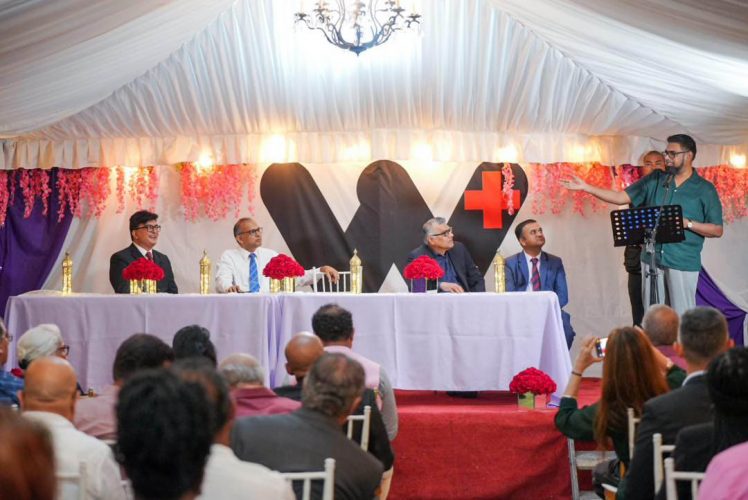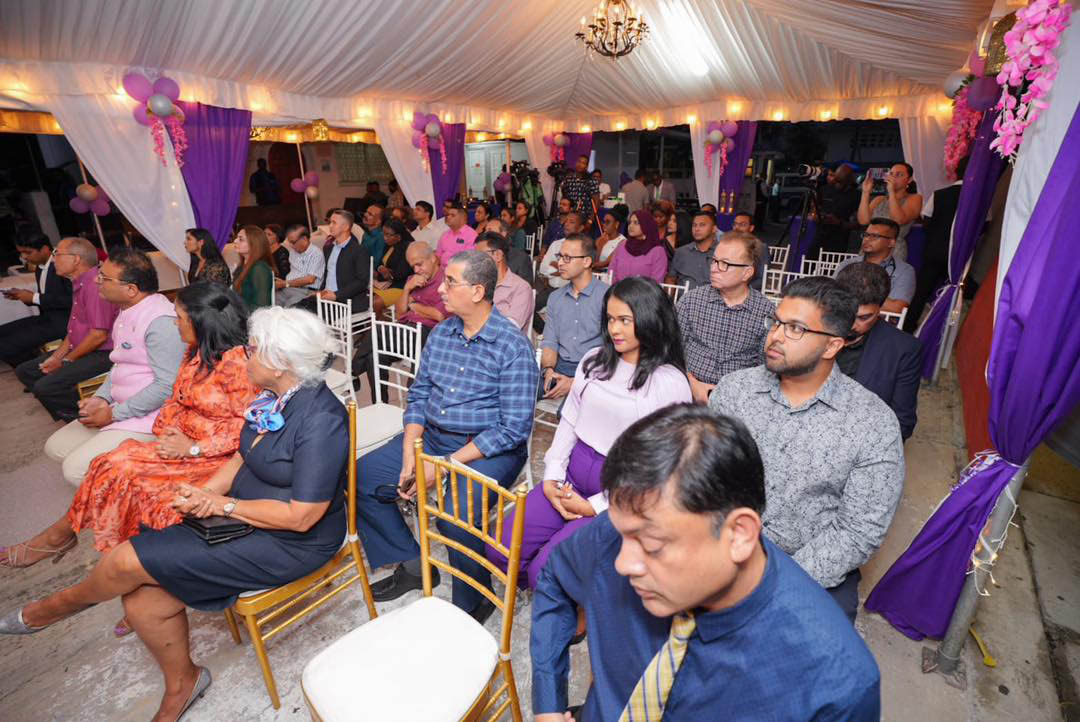In preparation for one day making Guyana a leader in the region for medical technology advancements in regenerative medicine and biomedical studies, government will be putting together a think tank of medical professionals to guide its healthcare policy framework and will be establishing a Medical Scientific Council, President Irfaan Ali said on Saturday.
On the grounds that one of the fundamentals of science was that it changes and evolves to bring a better quality of life through technologies, especially in medicine and medical care, Ali said the focus should be embracing holistic development of the sciences here.
“So if the science is dead the care is dead, if the science is dead the technology is dead,” Ali said as he delivered the keynote address at the Woodlands Hospital’s launch of its stem cell and immunotherapy services, a first in Guyana.

“That is why we now must move to this new level, which I intend to speak about more elaborately in the coming days, to the establishment of a national Medical Scientific Council,” he added.
The President reasoned that setting up the body with scientists and medical professionals both locally and internationally, would afford policy makers insight into cutting-edge developments globally and they can in turn plan accordingly.
“That brings our best talent to investigate, not old technology but the best in class medical science development that can be applied in Guyana to help us here. This is important to us; what is applicable and practical for our development, and that requires those who are responsible for medical care to go back to their foundation…,” he added.
Making reference to his recent state visit to India, Ali recalled that he saw technological developments in medicine firsthand and marvelled. He added that he was tested with a handheld device that in minutes could give readings and approximations on his cardiac health. To do ultrasound scans, he explained, that country also uses a small device that is held in hand. “No longer the days of that big machine in one place,” he articulated, while demonstrating how the process was one.
According to Ali, those two examples were only a few of the cutting-edge technological advances of New Delhi, as it stands on par with western nations in the area of science and research.
He singled out Dr Pramod Tembe of Woodlands Hospital, who was mentioned in India when discussions on research and medicine were being had.
Dr Tembe, who is part of the partnering team of the Trinidad-based Fidelity Healthcare Ltd, shared his personal story on why he chose his career path and the direct benefits stem cell research has had on his life.
The doctor, who has decades of experience in his field, told of being diagnosed with an autoimmune disease that almost crippled him, until at last resort he had a bone marrow transplant, which gave him a new lease on a purposeful life.
Woodlands Hospital said that through its collaboration with Fidelity Healthcare Ltd, it will “work to harness the therapeutic benefit of autologous bone marrow derived stem cells and Mesenchymal stem cells for the treatment of chronic diseases like diabetes, autoimmune diseases, muscular dystrophy, orthopaedic disorders, stroke, amyotrophic lateral sclerosis, pulmonary fibrosis, COPD, and spinal cord injury, among others.”
Woodlands officials said that the cost for some stem cell and immunotherapy treatments were as much as US$96,000; that same treatment here could be halved.
The importance of medical insurance was also underscored by Ali, who said, “I would like some discussions to start on this issue, between the financial specialists, people in the medical field and policy makers. We need to address …the whole issue of health insurance. This is an important issue that needs to be addressed and also put in that frame.”
‘A big deal’
Minister of Health Dr Frank Anthony told Stabroek News that as both a Guyanese and Minister of Health, he is upbeat about the advances that will be made.
“It’s relatively new technology and the potential of what these can do is still being discovered. What we know right now is that you can use these cells to repair cells that are damaged, organs that are damaged. Autoimmune diseases are a group of diseases that can be addressed and this can reduce this. In that way a lot of people will benefit and that is why this is a big deal,” he said.
On the proposed Medical Scientific Council, he said that this country “needs an expert group of people who can advise the government on the use of medical technologies.”
Pointing to the ground-breaking Human Organ and Tissue transplant legislation which was passed last year, Anthony said it was a part of setting the process for the works which will now come.
He noted that one section of the legislation provided for regenerative medicine and one aspect is using stem cells. “We anticipated this type of development and that is why we put it in the legislation. It would have otherwise been difficult to use. … A lot of countries … don’t have this type of legislation. We are one of few that put legislation [in place] to allow for these [treatments and research],” he said.
He said that while government at this point had not made a decision on if it will subsidise the treatment options offered, he believes that “even halving the cost is a significant breakthrough.”
Piggybacking on the President’s stance of adequate health insurance, he said, “Because of this newer technology, it would be important to us to start having health insurance. People need to find a way; it will be available but it is just affording [it]. One way will be to have insurance.”
For President Ali, ensuring a state where the provision of healthcare to its people is integral and paving the way for the country to become one where people look for state-of-the-art treatment and cutting edge research, is priority for him. “The state and the government [have] a responsibility to create this enabling environment to support this new architecture that we are building from an infrastructure perspective, from a legislative perspective, but more importantly from a primary healthcare perspective,” he said.
“When a public healthcare system is operating efficiently and reliably, it allows enough information to change the health information set and the healthcare set, before a health crisis occurs. What that means is that stem cells are highly effective where there are early diagnostics… this is important. So the public healthcare system must be able to support diagnostics at a very early stage. Once that occurs the science now must be implemented at that early stage.”





